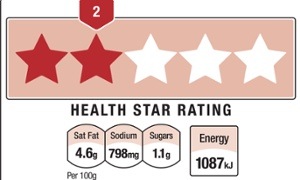
Consumer group Choice has slammed food manufacturers including Kellogg’s for failing to sign up to the federal government’s voluntary health star labelling regime.
Under the system, launched in December, foods are rated from half a star up to five stars for the healthiest products. Products are scored according to their energy, fat, sugar and salt content.
So far, supermarket giants Coles and Woolworths have the stars on their private labels while some such as Sanitarium, Nestlé, Uncle Tobys and Lion products also display them.
However, Choice said a number of companies, including US multinational Kellogg’s, were refusing to take part.
“Food manufacturers have been on notice since June last year to implement the new health star scheme however iconic brands such as Kellogg’s, McCain and Mars are still refusing to serve up the information consumers need,” Choice spokesman Tom Godfrey said on Tuesday.
“It’s just not good enough that a major player like Kellogg’s, that sells popular brands Just Right, Special K, Coco Pops and Nutri-Grain, are withholding basic health information and that’s why we have launched this campaign.”
He said the labelling system cut through “marketing hype” and made it easier for consumers to make healthier choices.
Kellogg’s said it was not in a position to comment.
Health groups have been calling for the voluntary system to be made mandatory, and say most Australians support making it compulsory to help battle obesity.
The health star labelling system was developed by the federal government with state and territory governments, the New Zealand government, as well as industry, public health and consumer groups.
It was first agreed upon at a meeting of government ministers in 2013, when it was flagged that if there was a low adoption rate by manufacturers after two years, mandatory labelling would likely be implemented.
Australia has one of the highest rates of obesity in the world with 63% of adults and one in four children being overweight or obese.
The deputy chairman of the National Preventative Health Taskforce, Mike Daube, said the failure by industry to adopt the system was “outrageous”.
“Here we have a good, straightforward warning system agreed by all Australian governments and key health authorities – and multinational companies seem to be sabotaging it,” Daube, a professor of public health, said.
“That displays a cynical disregard for both public health and the will of governments. If these companies don’t implement the star system, governments will have no option but to legislate.”
It comes as a survey from a coalition of public health organisations found Australian cereal manufacturers were misleading consumers by making healthy claims in their marketing of the products, despite some comprising more than 35% sugar.
The Obesity Policy Coalition (OPC) analysed 20 popular breakfast cereals and found that the majority of products carried healthy sounding claims such as a “source of fibre”, “69% wholegrain” and “no artificial flavours” despite being laden with sugar.
“The Health Star Rating system was introduced more than a year ago to help consumers compare the overall nutritional quality of products at a glance,” OPC executive manager, Jane Martin, said.
“The system helps consumers better understand a product’s overall health rating so they can make informed choices, but our research has revealed very few cereals, as yet, carry the star label.”
The average sugar content of all 20 cereals analysed was 19.8g per 100g, equating to about five teaspoons of sugar.
Guardian Australia has contacted the Australian Food and Grocery Council, the peak body for Australia’s packaged food, drink and grocery product manufacturers, for comment.
